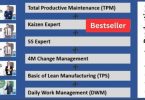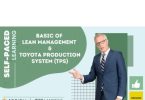What is Operational Excellence?
Operational Excellence (OE) is a business philosophy and methodology that focuses on the continuous improvement and optimization of an organization’s operations. At its core, OE is about creating a culture of excellence where everyone in the organization is committed to delivering the highest quality products and services while maximizing efficiency and minimizing waste.
OE is not a one-time event or project; it is an ongoing process of refining and streamlining business processes to achieve maximum effectiveness and efficiency.
It involves identifying and eliminating any barriers to efficiency, reducing waste, and minimizing errors and defects in operations. OE also involves empowering employees at all levels to take ownership of the processes they are involved in and continuously improve them.
The Importance of Operational Excellence in Business
Operational Excellence is crucial for the success of any business, especially in today’s highly competitive environment. Here are some reasons why:
Improved Efficiency and Productivity
Operational Excellence helps businesses to streamline processes, reduce waste, and optimize resources to improve efficiency and productivity. This can result in cost savings, faster delivery times, and higher-quality products and services.
Increased Customer Satisfaction
Operational Excellence focuses on improving customer satisfaction by understanding and meeting their needs. By continuously improving processes, businesses can deliver products and services that exceed customer expectations, leading to increased loyalty and retention.
Competitive Advantage
Businesses that achieve Operational Excellence can gain a significant competitive advantage. By continuously improving processes and reducing costs, businesses can offer products and services at lower prices, making them more attractive to customers.
Employee Engagement
Operational Excellence involves creating a culture of continuous improvement, where all employees are engaged in the process of making the business better. This can result in increased job satisfaction, employee retention, and a higher-quality workforce.
Key Principles of Operational Excellence
To achieve Operational Excellence, businesses must adopt a set of key principles that guide their approach to process improvement. Here are some of the most important principles:
- Customer Focus
Operational Excellence starts with a deep understanding of customer needs and expectations. Businesses must align their processes with customer requirements to deliver products and services that meet or exceed their expectations.
2. Continuous Improvement
Operational Excellence is a journey, not a destination. It requires a continuous improvement mindset, where all employees are committed to identifying and eliminating waste, reducing defects, and improving processes.
3. Leadership
Leadership is critical to achieving Operational Excellence. Leaders must set the tone for the organization and demonstrate a commitment to excellence through their actions and behaviors.
4. Employee Engagement
Operational Excellence cannot be achieved without the engagement and involvement of all employees. Businesses must create a culture of continuous improvement, where all employees are encouraged to identify and solve problems.
5. Data-Driven Decision Making
Operational Excellence requires a data-driven approach to decision-making. Businesses must collect and analyze data to identify areas for improvement and measure progress against goals.
Challenges of Operational Excellence
While Operational Excellence is a valuable approach to improving organizational performance and achieving long-term success, it also comes with its own set of challenges. The following are some of the key challenges that organizations may face when implementing Operational Excellence:
- Cultural Resistance: Implementing Operational Excellence requires a cultural shift in the organization, and many employees may resist change or feel uncomfortable with new ways of working. It is essential to engage employees and build buy-in from all levels of the organization to overcome cultural resistance.
- Lack of Leadership Support: Operational Excellence requires strong leadership and commitment from senior management to succeed. Without leadership support, it can be challenging to gain traction and sustain momentum for continuous improvement efforts.
- Insufficient Resources: Achieving Operational Excellence requires resources such as time, money, and personnel. If an organization fails to allocate sufficient resources, it may struggle to implement Operational Excellence effectively.
- Ineffective Communication: Communication is essential to successful Operational Excellence. Without clear communication channels and messaging, employees may not understand the purpose of Operational Excellence efforts or their roles in the process.
- Inadequate Training: Proper training is critical to the success of Operational Excellence initiatives. If employees do not receive adequate training on the tools and techniques used in Operational Excellence, they may struggle to implement and sustain improvement efforts.
- Lack of Data-Driven Decision-Making: Operational Excellence relies on data-driven decision-making to identify improvement opportunities and track progress. Without accurate and reliable data, organizations may struggle to make informed decisions and achieve desired outcomes.
- Over-Reliance on Tools: Operational Excellence methodologies such as Lean Six Sigma and Kaizen rely on specific tools and techniques. However, organizations may over-rely on these tools and fail to apply critical thinking and problem-solving skills to identify and address unique challenges.
To address these challenges, organizations should take a holistic approach to Operational Excellence, focusing not just on tools and techniques, but also on culture, leadership, communication, and data-driven decision-making. By addressing these challenges head-on, organizations can implement Operational Excellence effectively and achieve long-term success.
Difference between Operational Excellence and Continuous Improvement
Operational Excellence (OE) and Continuous Improvement (CI) are two approaches to organizational management that are often used interchangeably, but they have different focuses and objectives. The following are some of the key differences between Operational Excellence and Continuous Improvement:
Scope:
Operational Excellence focuses on improving the overall performance and efficiency of an organization across all functions, processes, and departments. It encompasses a wide range of methodologies and tools, such as Lean Six Sigma, Total Quality Management, and Kaizen, to achieve holistic and sustainable improvement in organizational performance. In contrast, Continuous Improvement focuses on making incremental improvements in specific processes or functions to enhance efficiency, productivity, and quality.
Long-term vs. Short-term Goals:
Operational Excellence is a long-term approach that aims to achieve continuous improvement in organizational performance over time. It is focused on creating a culture of continuous improvement and sustainable change. Continuous Improvement, on the other hand, focuses on achieving short-term goals through incremental improvements in specific areas of the organization.
Culture:
Operational Excellence requires a culture of continuous improvement that is ingrained in the organization’s values and behaviors. It requires a deep commitment from all levels of the organization to embrace change and adopt new ways of working. Continuous Improvement may not require such a deep cultural shift and may be more focused on identifying and solving specific problems.
Top-down vs. Bottom-up Approach:
Operational Excellence often requires a top-down approach, with senior leadership setting the vision and direction for the organization’s improvement efforts. Continuous Improvement, on the other hand, may be driven more by front-line employees who identify and address specific improvement opportunities.
Metrics:
Operational Excellence is often measured by a set of metrics that reflect the overall performance and efficiency of the organization. These metrics may include customer satisfaction, cycle time, defect rates, and productivity. Continuous Improvement is often measured by specific metrics related to the area or process being improved.
In summary, Operational Excellence is a holistic, long-term approach to organizational management that aims to achieve sustainable improvement in performance across all areas of the organization. Continuous Improvement is a more focused approach that aims to achieve short-term gains through incremental improvements in specific areas. Both approaches can be valuable in enhancing organizational performance, and the choice of approach will depend on the specific needs and goals of the organization.
What are the 4 pillars of operational excellence?
Operational Excellence (OE) is a management philosophy that aims to improve the performance of an organization by continuously identifying and eliminating waste, reducing variation, and improving efficiency and effectiveness. The four pillars of Operational Excellence are a framework that provides a structured approach to implementing OE. The following are the four pillars of Operational Excellence:
Pillar # 01: Continuous Improvement:
Continuous Improvement is the ongoing process of identifying and eliminating waste, reducing variation, and improving efficiency and effectiveness in all areas of an organization. This pillar involves the use of tools and methodologies such as Lean Six Sigma, Kaizen, Total Quality Management (TQM), and others to identify improvement opportunities, implement changes, and measure progress.
Pillar # 02: Leadership:
Leadership is a critical pillar of Operational Excellence, and it involves creating a culture of continuous improvement and providing the necessary resources and support to implement OE effectively. This pillar includes setting the vision and strategy for OE, communicating it effectively to employees, and leading by example.
Pillar # 03: Employee Engagement:
Employee Engagement involves creating an environment where employees are empowered to identify and implement improvement opportunities. This pillar includes providing training and development opportunities, recognizing and rewarding employee contributions, and creating a culture of collaboration and teamwork.
Pillar # 04: Business Process Management:
Business Process Management (BPM) involves designing, documenting, and improving business processes to enhance efficiency and effectiveness. This pillar includes identifying and prioritizing critical business processes, defining process metrics, and continually monitoring and improving processes.
Conclusion
In summary, the four pillars of Operational Excellence provide a structured approach to improving organizational performance by focusing on continuous improvement, leadership, employee engagement, and business process management. By implementing these pillars effectively, organizations can achieve sustained improvement in performance and achieve long-term success.
Certified Operational Excellence Course from ‘Quality HUB India’
Certified Operational Excellence Manager (COEM)
Six Sigma Courses from ‘Quality HUB India’
- Six Sigma White Belt (FREE) -E Certificate Available
- Lean Six Sigma Yellow Belt (LSSYB) Hindi Version
- Lean Six Sigma Yellow Belt (LSSYB) English Version
- Lean Six Sigma Green Belt (LSSGB) Hindi Version
- Lean Six Sigma Green Belt (LSSGB) English Version
- Lean Six Sigma Black Belt (LSSBB) Hindi Version
- Lean Six Sigma Black Belt (LSSBB) English Version








